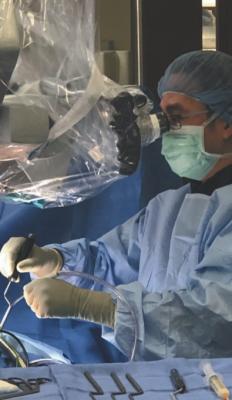Ochsner Neurosurgery

Why Minimally Invasive Spinal Surgery is the Best Route
Many spine patients are frightened when hearing the word “surgery,” envisioning the surgeon with scalpel in hand making long incision lines. However, gone are the days of traditional spinal surgery. Many patients are now candidates for minimally invasive spinal surgery that uses new technology and techniques to minimize the number of incisions needed and to lessen the trauma the body experiences
during surgery. This allows patients to heal faster and, typically, with fewer long-term complications.
There is usually only one small surgical incision during minimally invasive spinal surgery on the lower back. With the use of special instruments, including computerguided imagery and even robotic devices, surgeons can navigate through muscle fibers to gain greater visibility while viewing internal structures magnified on a screen. With minimally invasive techniques, surgeons can repair the spine with minimal disruption to the surrounding muscles and tissues and minimal blood loss.
What are the benefits of minimally invasive spinal surgery?
Although physical therapy and medication are typically the first lines of defense, patients often have to opt for spinal surgery. So, what are the benefits of minimally invasive spinal surgery vs. traditional open spinal surgery?
1. Quicker Recovery With any surgery, the patient’s body undergoes trauma. However, with minimally invasive surgery, there is little to no muscle cutting, which allows the body to focus on healing the spine rather than the surrounding muscle. Since little damage occurs to the muscle and tissue, the patient typically recovers much faster than traditional open spinal surgery patients.
2. Less Post-Operative Pain Smaller and fewer incisions mean less damage to the body, which results in less pain. This also means that patients usually require less pain medication after surgery, decreasing the chances of addiction.
 3. Fewer Complications While all surgeries come with risk, minimally invasive spinal surgery significantly decreases the level of common surgical complications. Less blood loss occurs, and smaller incisions lower the risk of developing post-surgical infections.
3. Fewer Complications While all surgeries come with risk, minimally invasive spinal surgery significantly decreases the level of common surgical complications. Less blood loss occurs, and smaller incisions lower the risk of developing post-surgical infections.
4. Shorter Hospital Stays Many procedures are performed on an outpatient basis, so patients will be allowed to return home the same day as the procedure. In some cases, patients may be required to stay overnight for observation.
5. Minimal Scarring Because the incisions are so small, patients achieve a better cosmetic result than traditional open spinal surgery.
What conditions can be treated with minimally invasive spinal surgery?
While not all conditions are treatable with minimally invasive spinal surgery, with advances in technology, many conditions previously treated with open surgery can now be treated with minimally invasive techniques. The most common conditions treated with minimally invasive spinal surgery are scoliosis, herniated discs, spinal stenosis, sciatica and degenerative disc diseases.
There are, of course, some exceptions, as with any surgery due to specific patient conditions and other health concerns. Yet, when minimally invasive spinal surgery is an option, it offers, by far, more benefits than traditional open surgery.
The Ochsner LSU Health Department of Neurosurgery’s Spine Team offers the latest technology to assist in minimally invasive spinal surgery. To discuss the benefits and to see if you are a candidate for minimally invasive spinal surgery, contact us at 318- 626-0203.
Stanley Hoang, MD, is a neurosurgeon in the Ochsner LSU Health Shreveport Department of Neurosurgery specializing in advanced minimally invasive and complex spinal surgery. Dr. Hoang received a Bachelor of Arts in human biology, a Master of Science in biological sciences, and his MD from Stanford University School of Medicine. He then completed his neurosurgery residency at the University of Missouri, followed by a complex spine fellowship at the University of Cincinnati. Dr. Hoang and his team make all efforts to always be available, attentive, and to treat all patients with dignity, respect and empathy.
